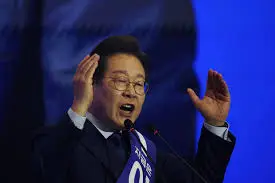South Korea presidential candidate Lee says to restore hotline with North Korea

South Korea is heading toward a crucial presidential election on June 3. The frontrunner, Lee Jae-myung, has promised to reopen communication channels with North Korea. This includes restoring the military hotline, which has been severed for over two years. His pledge signals a possible thaw in one of East Asia’s most tense conflicts.
Reopening the Lines of Communication
Lee, from the liberal Democratic Party, said restoring the hotline will be a top priority if he wins. The military hotline was cut off in 2023 amid rising tensions. It was a key channel to prevent misunderstandings and ease conflicts along the heavily guarded border. Since its closure, the risk of accidental clashes has grown, worrying many regional experts.
Lee said reopening the hotline is about more than communication. He stressed the need to rebuild trust between the two Koreas. “Dialogue forms the foundation of peace,” Lee stated. “Without communication, misunderstandings increase, and conflicts become more likely. Reconnecting the hotline is the first step toward a stable and peaceful Korean Peninsula.”
A Broader Diplomatic Vision
Restoring the hotline is part of Lee’s wider plan to improve South Korea’s diplomacy. He criticized the current government’s tough stance, which he says has caused a deadlock with North Korea and strained relations with China and Japan.
Under President Yoon Suk Yeol, South Korea took a hardline approach. Yoon declared martial law in December 2024 during domestic unrest. This move sparked protests and led to his impeachment and removal from office. Lee calls his campaign a response to that chaotic period. He favors a more practical and diplomatic foreign policy.
Managing Regional Relations
Lee wants to repair relations with China, South Korea’s largest trading partner. He argued that the previous government failed to balance relations with Beijing properly. Lee believes engagement, not confrontation, is key.
He also aims to resolve long-standing disputes with Japan. These historical and territorial issues have made cooperation difficult among South Korea, Japan, and the United States. Lee plans to manage these disagreements constructively. He wants to strengthen cooperation on security and economic issues between the three countries.
Strengthening the U.S.-South Korea Alliance
Lee also highlights the importance of the U.S.-South Korea alliance. He pledged to upgrade it to a “comprehensive strategic alliance.” This shows his commitment to strong security ties. He also plans to expand cooperation in technology, climate change, and the economy.
Lee’s approach reassures both allies and neighbors. He seeks peace through dialogue, cooperation, and mutual respect.
Challenges Ahead
Though many voters support Lee’s plans, the road ahead is difficult. North Korea remains unpredictable. It continues weapons tests and provocations, making talks harder. The world watches closely how South Korea’s new policies will affect regional balance.
Domestically, South Korea remains divided. Some critics say Lee is too soft on Pyongyang. They worry reopening communication could weaken security. Supporters say lasting peace needs dialogue. They believe Lee’s plan is the most realistic way forward.
Implications for the Korean Peninsula and Beyond
Restoring the hotline will bring immediate benefits. It allows direct talks during emergencies to avoid accidental conflict. More importantly, it can lead to talks on denuclearization, aid, family reunions, and economic cooperation.
Internationally, it will signal South Korea’s commitment to peace. This will reassure allies and partners about regional stability.
The Election as a Referendum on Foreign Policy
Lee’s campaign presents the election as a choice between different foreign policies. After years of instability and tension, voters will decide between a hardline approach or Lee’s diplomacy.
Opinion polls show Lee leading and likely to become the next president. His win could open a new chapter in relations with North Korea and neighboring countries.
Conclusion
Lee Jae-myung’s promise to restore the hotline is more than a technical fix. It offers hope for renewed dialogue and reduced tensions. If successful, it could help create a peaceful and cooperative East Asia.
As South Korea votes, the world watches. The next leader will face one of the most complex diplomatic challenges today.






